第49章 CHAPTER XVI(1)
IT was late afternoon by the banks of a swiftly rushing river, a river that gave back a haze of heat from its waters as though it were some stagnant steaming lagoon, and yet seemed to be whirling onward with the determination of a living thing, perpetually eager and remorseless, leaping savagely at any obstacle that attempted to stay its course; an unfriendly river, to whose waters you committed yourself at your peril. Under the hot breathless shade of the trees on its shore arose that acrid all-pervading smell that seems to hang everywhere about the tropics, a smell as of some monstrous musty still-room where herbs and spices have been crushed and distilled and stored for hundreds of years, and where the windows have seldom been opened. In the dazzling heat that still held undisputed sway over the scene, insects and birds seemed preposterously alive and active, flitting their gay colours through the sunbeams, and crawling over the baked dust in the full swing and pursuit of their several businesses; the flies engaged in Heaven knows what, and the fly-catchers busy with the flies.
Beasts and humans showed no such indifference to the temperature; the sun would have to slant yet further downward before the earth would become a fit arena for their revived activities. In the sheltered basement of a wayside rest-house a gang of native hammock-bearers slept or chattered drowsily through the last hours of the long mid-day halt; wide awake, yet almost motionless in the thrall of a heavy lassitude, their European master sat alone in an upper chamber, staring out through a narrow window-opening at the native village, spreading away in thick clusters of huts girt around with cultivated vegetation. It seemed a vast human ant- hill, which would presently be astir with its teeming human life, as though the Sun God in his last departing stride had roused it with a careless kick. Even as Comus watched he could see the beginnings of the evening's awakening. Women, squatting in front of their huts, began to pound away at the rice or maize that would form the evening meal, girls were collecting their water pots preparatory to a walk down to the river, and enterprising goats made tentative forays through gaps in the ill-kept fences of neighbouring garden plots; their hurried retreats showed that here at least someone was keeping alert and wakeful vigil. Behind a hut perched on a steep hill-side, just opposite to the rest-house, two boys were splitting wood with a certain languid industry; further down the road a group of dogs were leisurely working themselves up to quarrelling pitch. Here and there, bands of evil-looking pigs roamed about, busy with foraging excursions that came unpleasantly athwart the border-line of scavenging. And from the trees that bounded and intersected the village rose the horrible, tireless, spiteful-sounding squawking of the iron-throated crows.
Comus sat and watched it all with a sense of growing aching depression. It was so utterly trivial to his eyes, so devoid of interest, and yet it was so real, so serious, so implacable in its continuity. The brain grew tired with the thought of its unceasing reproduction. It had all gone on, as it was going on now, by the side of the great rushing swirling river, this tilling and planting and harvesting, marketing and store-keeping, feast-making and fetish-worship and love-making, burying and giving in marriage, child-bearing and child-rearing, all this had been going on, in the shimmering, blistering heat and the warm nights, while he had been a youngster at school, dimly recognising Africa as a division of the earth's surface that it was advisable to have a certain nodding acquaintance with.
It had been going on in all its trifling detail, all its serious intensity, when his father and his grandfather in their day had been little boys at school, it would go on just as intently as ever long after Comus and his generation had passed away, just as the shadows would lengthen and fade under the mulberry trees in that far away English garden, round the old stone fountain where a leaden otter for ever preyed on a leaden salmon.
Comus rose impatiently from his seat, and walked wearily across the hut to another window-opening which commanded a broad view of the river. There was something which fascinated and then depressed one in its ceaseless hurrying onward sweep, its tons of water rushing on for all time, as long as the face of the earth should remain unchanged. On its further shore could be seen spread out at intervals other teeming villages, with their cultivated plots and pasture clearings, their moving dots which meant cattle and goats and dogs and children. And far up its course, lost in the forest growth that fringed its banks, were hidden away yet more villages, human herding-grounds where men dwelt and worked and bartered, squabbled and worshipped, sickened and perished, while the river went by with its endless swirl and rush of gleaming waters. One could well understand primitive early races making propitiatory sacrifices to the spirit of a great river on whose shores they dwelt. Time and the river were the two great forces that seemed to matter here.